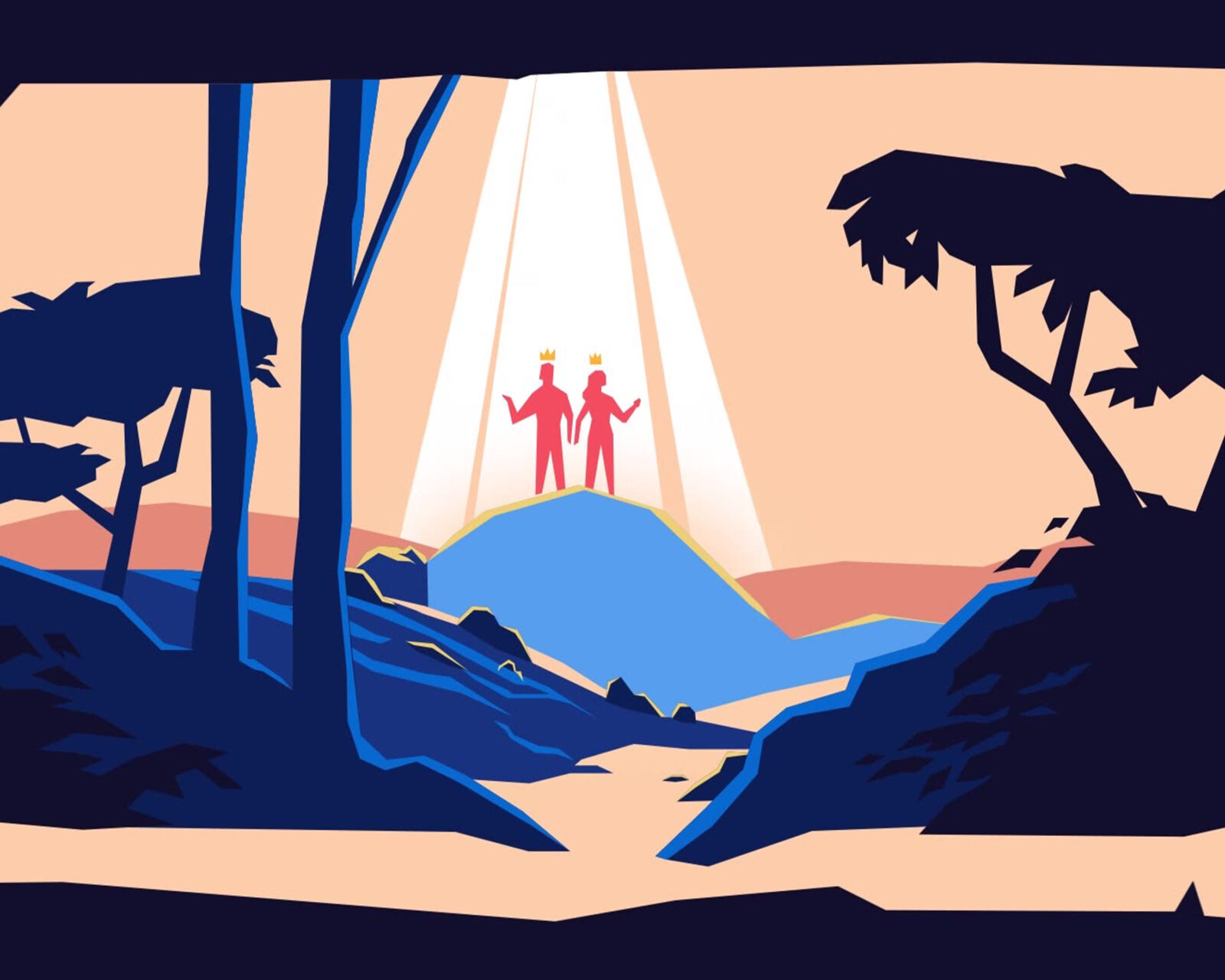Video Transcript
Emily: Let’s say you bump into God at a party.
Edmund: Okay. First of all, does God go to parties?
Emily: Well, let’s just say you’re at a party and you bump into God. How would you introduce yourself if you were trying to act normal?
Edmund: I mean, I’d probably say something like, Hey, I’m Edmond, but you probably already knew that.
Emily: Yeah. I am also wondering how God would be introduced
Edmund: In the Bible. I remember this famous incident involving Moses, God, and a mysterious burning.
Emily: Exactly. God appears to Moses in a burning bush and speaks to him. God tells Moses “I am the God of your father, the God of Abraham and Isaac and the God of Jacob.”
But Moses asks him for his real name. God says out of the bush, “I am who am. Say this to the people of Israel. ‘I am’ has sent you. This is my name forever. And thus I am to be remembered throughout all generations.”
Edmund: Yeah, that’s a pretty intense and mysterious introduction. What do you say to that? If you’re Moses?
Emily: Even when God reveals his name, he still remains a mystery beyond words. What do we mean when we say “God?” The Creed starts with, “I believe in God.”
Edmund: And what’s a creed, again?
Emily: A creed as an important summary of the faith. The first four words of the Apostle’s Creed says, “I believe in God.” We don’t say, “I behave”, or “I act,” or “I will follow and commit.” We say, “I believe.” And it’s not just what we believe in, it’s who.
Edmund: Okay. So this is why you brought up the burning bush, where God revealed his name, which implies the beginning of a relationship. If you learn someone’s name, you’re entering into a relationship with them.
Emily: Yes, exactly. Have you ever stopped to think about what you mean when you say, “I believe in God,” like who is God? What is God like?
Edmund: Christianity is focused on this personal belief, built on a relationship. At the core of being a Christian is not, “I believe in something,” but “I believe in you, God.”
Emily: Yes, God revealed himself to Moses as a father. And Jesus reveals this too. God desires, a very intimate relationship with us through the Holy Spirit. And we get a peek into what that relationship might look like by the life of Jesus who lived perfectly in relationship with God, his father.
Edmund: Okay. So we get a glimpse into what it might be like to be in relationship with God as our Father. And so to profess the Creed with the Church is to enter into a relationship with God who is the Father, Son, and Holy Spirit.
Emily: This brings us to one of the most important parts of what God has revealed. God revealed himself as one God. There are no other gods. He is the one God. God is the beginning. And end of all that has been created. God just is.
I can get behind that. God is infinite
Edmund: and outside of time and space. And he’s what brought everything into existence.
Emily: Yes. Which also means that God is truth and love itself. God is truthful because he also is truth itself. God has revealed that he does not deceive and does not get confused and does not do anything other than be constant in his faithfulness and truthfulness.
Edmund: If God is truth itself, then when God reveals himself, he must tell us the truth.
Emily: God called Moses from the burning bush and told him he is faithful to his people and will bring about his plan of loving goodness for humanity.
Edmund: And God is love. Right? We’ve all heard that one.
Emily: You’ve heard it, but maybe we haven’t stopped to think about it. We hopefully experience love, or have an idea of what love is.
God doesn’t just have love. God is love ,the origin and destination of all love. When we experience truth and love, it is a participation in a small bit of God and who he is.
Edmund: Okay, yeah. But how has God loved us specifically? Or me?
Emily: Time and time again, throughout salvation history, God always offered mercy to his people, even when they strayed far from him. Despite the sin we fall into and the punishment it justly would deserve, God still offers mercy. God went so far that he gave up his own Son for us. Jesus came and offered himself as a sacrifice for the forgiveness of our sins.
Edmund: And that’s a big sign of his love for us.
Emily: Which means that throughout all of salvation history, we have discovered that God had only one reason to reveal himself to us, his sheer love.
Edmund: So God desires a relationship with us. God wants us to know him and love him.
Yes, Jesus
Emily: said we should love God with all our heart, mind, and soul. We are called to profess, I believe in God. And this belief in God really changes a lot for our lives. Everyone is called to faith and relationship with God. It means knowing God’s immense greatness. But it also means understanding the unity and dignity of all people. Faith in God also means we can make good use of the creative things in the world that God has made. And finally saying, “I believe in God” also means that we model Jesus and his belief and trust in the Father in every circumstance.
Edmund: Boy, we’re only four words into the Creed and there’s already been so much to unpack. Now I get the saying, “I believe in God” is a statement of who and what we believe.
Emily: The Catechism in paragraph 231 says, “the God of our faith has revealed himself as he who is. And he has made himself known as abounding in steadfast love and faithfulness.
God’s very being is truth and love.” It’s like God has introduced himself to us. And when we respond to that introduction by saying, “I believe in God,” that changes everything because of who God is.




